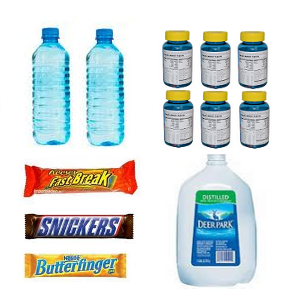 Many people understand the importance of having short and long-term food storage. Adequate food storage can protect you and your loved ones from financial crisis, unforeseen natural disasters, disease outbreaks, war time, road closures, economic instability, damaged crops and any number of unforeseen catastrophes which can shut off our food supply. However, there may be areas of your food storage that have been overlooked, leaving you and your loved ones susceptible. Here are three items you won’t want to be without.
Many people understand the importance of having short and long-term food storage. Adequate food storage can protect you and your loved ones from financial crisis, unforeseen natural disasters, disease outbreaks, war time, road closures, economic instability, damaged crops and any number of unforeseen catastrophes which can shut off our food supply. However, there may be areas of your food storage that have been overlooked, leaving you and your loved ones susceptible. Here are three items you won’t want to be without.
Running water seems so common place in our lives that it’s easy to take it for granted every time we turn on the faucet. Humans can survive up to a month without food; however, they can only survive three to seven days without water. Water supplies can become contaminated or even shut off completely for hours or days after a natural disaster.
The Federal Emergency Management Agency (FEMA) recommends storing at least 3 gallons of water per person in every household. This amount of water should be sufficient for an average person to survive for 3 days in the event that water sources become scarce or unavailable. In addition to drinking, this stored water would be used for things such as washing hands, bathing, and washing dishes, so you may choose to store more than 3 gallons per person.
Your water supply can be bought pre-packaged or stored in your own plastic containers. Many online tutorials are available to guide you through proper water storage and avoid bacterial growth. Additionally, water purification systems are a great asset to your food storage, as culinary water may be contaminated or unavailable longer than three days.
Vitamins
Even though vitamins are essential to maintaining our physical and mental health, they are not found on the food storage shelves of many homes. Consider the fact that vitamins in most canned foods are quite depleted, and the longer your cans sit on a shelf, the more depleted they become. In order to boost the vitamins in your food storage, store an assortment of different foods in a variety of ways including freeze dried and dehydrated. Such methods of storing have a better track record for maintaining their natural vitamins.
In addition to boosting the nutritional shelf life of your food storage, include the following vitamin supplements in your storage:
- Daily multi vitamins for adults and children
- Vitamin B – deficiencies have been linked to depression
- Vitamin D – deficiencies have been linked to depression, osteoporosis and rickets in children
- Vitamin C – helps boost your immune system
Be sure to store all vitamins in a cool dry place, make note of the expiration dates in large print for easy reading and rotate them along with the rest of your food storage.
Comfort Items
When we find ourselves in the middle of an emergency, tensions often run high and life becomes unpredictable and stressful for everyone. Be sure your food storage has a few of what some call “psychological foods.” These are the yummy snacks and treats you and your family are used to enjoying. A sweet treat from time to time can lift the spirits of everyone.
For some, this may be freeze dried ice cream, chocolate, pudding, mini snack cakes or dessert pastry pockets. Others who enjoy salty things may like a bag of chips or a box of cheesy crackers to snack on. A few of these items in your food storage can go a long way in keeping survivors’ (especially children) sanity and spirits high during hard times.
In addition to “psychological foods,” it may be wise to include a deck of cards or a new box of crayons and coloring books to keep little hands busy, happy and out of trouble.
No one knows when a disaster may strike. Be prepared by making sure your family will be well fed, adequately hydrated and physically and mentally healthy.
ABOUT THE AUTHOR: Lee Flynn is a freelance writer and has interests in emergency preparedness and food storage.









